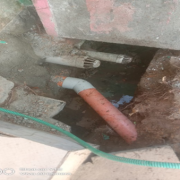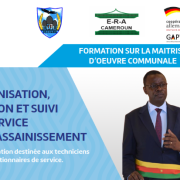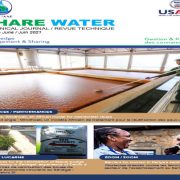Tamil Nadu is a rapidly urbanising state that has been establishing and scaling up sustainable FSSM, leading the way in innovating technologies and operating models in sanitation. Safe collection, handling, and transport of fecal sludge (FS) is an integral part of a septage management programme. This paper documents the use of load axle sensors with GPS technology in the de-sludging vehicle to understand the movement of the vehicle, de-sludging and disposal locations, travel distance and time, and the time for de-sludging and decanting. These learnings help determine the location of current disposal, service area, and planning of decanting facilities.
As a matter of fact, de-sludging vehicles collect and transport septage to designated decanting facilities, eliminating the need for manual emptying and reducing the risk of human contact with FS. As per the Tamil Nadu Urban Local Bodies (Amendment) Act (2022), the desludging vehicle must install a GPS device to monitor the de-sludging and decanting activities.
However, GPS can only track the movement of the vehicle and not locate de-sludge locations and whether operators were safely decanting the FS at the designated spot. Identification of the desludging and decanting locations with loaded quantities using GPS technology is difficult and a highly time-consuming process. The time required to analyse each vehicle could be a challenge for the ULBs as they scale this monitoring strategy.
Therefore, a study done on this aspect by the Tamil Nadu Urban Sanitation Support Programme (TNUSSP), intended to identify the possibilities of monitoring the de-sludging vehicles using a load sensor with GPS technology.
This monitoring helps identify the service area of the vehicle, the desludging and decanting locations, quantity of FS collected, travel time and distance between desludging and decanting locations, and time for desludging and decanting. The analysis of travel distance and time aids for planning additional decanting facilities. Additionally, the vehicle was discovered to be loaded overnight and parked, so it is advised to keep the decanting station open at night as well.
Field teams are working on upgrading the system with an ultrasonic load sensor for more accuracy at an affordable cost. Also, the option of incorporating the sensor output with the FSSM application to plan schedule de-sludging, auto deduction of decanting fee and real-time plant utilization rate, etc., are under progress.
The major challenges associated with scaling this monitoring technique are as follows.
- Requirement of an efficient monitoring system within the ULB
- Highly priced system: Possibility of vehicle owners with more number of vehicles refusing to adopt
- Lower acceptance among de-sludging operators for installation fearing regular monitoring of their activities
- Possibility of vehicle operators tampering with device
- Difficulty in orientation for desludging operators about proper desludging and decanting due to frequent changes in personnel.
Download the full article to read more.







